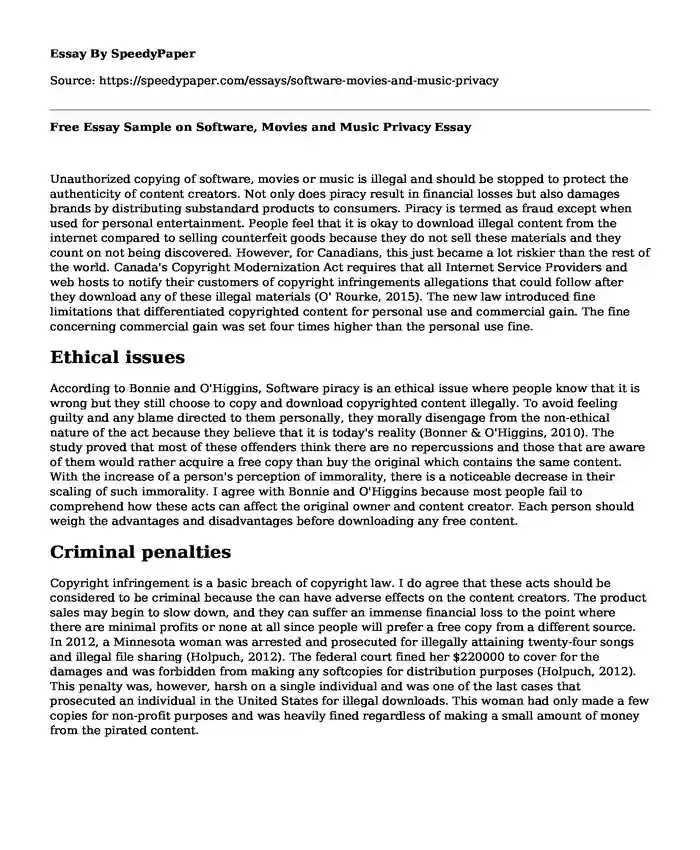Unauthorized copying of software, movies or music is illegal and should be stopped to protect the authenticity of content creators. Not only does piracy result in financial losses but also damages brands by distributing substandard products to consumers. Piracy is termed as fraud except when used for personal entertainment. People feel that it is okay to download illegal content from the internet compared to selling counterfeit goods because they do not sell these materials and they count on not being discovered. However, for Canadians, this just became a lot riskier than the rest of the world. Canada's Copyright Modernization Act requires that all Internet Service Providers and web hosts to notify their customers of copyright infringements allegations that could follow after they download any of these illegal materials (O' Rourke, 2015). The new law introduced fine limitations that differentiated copyrighted content for personal use and commercial gain. The fine concerning commercial gain was set four times higher than the personal use fine.
Ethical issues
According to Bonnie and O'Higgins, Software piracy is an ethical issue where people know that it is wrong but they still choose to copy and download copyrighted content illegally. To avoid feeling guilty and any blame directed to them personally, they morally disengage from the non-ethical nature of the act because they believe that it is today's reality (Bonner & O'Higgins, 2010). The study proved that most of these offenders think there are no repercussions and those that are aware of them would rather acquire a free copy than buy the original which contains the same content. With the increase of a person's perception of immorality, there is a noticeable decrease in their scaling of such immorality. I agree with Bonnie and O'Higgins because most people fail to comprehend how these acts can affect the original owner and content creator. Each person should weigh the advantages and disadvantages before downloading any free content.
Criminal penalties
Copyright infringement is a basic breach of copyright law. I do agree that these acts should be considered to be criminal because the can have adverse effects on the content creators. The product sales may begin to slow down, and they can suffer an immense financial loss to the point where there are minimal profits or none at all since people will prefer a free copy from a different source. In 2012, a Minnesota woman was arrested and prosecuted for illegally attaining twenty-four songs and illegal file sharing (Holpuch, 2012). The federal court fined her $220000 to cover for the damages and was forbidden from making any softcopies for distribution purposes (Holpuch, 2012). This penalty was, however, harsh on a single individual and was one of the last cases that prosecuted an individual in the United States for illegal downloads. This woman had only made a few copies for non-profit purposes and was heavily fined regardless of making a small amount of money from the pirated content.
Responsibility to control piracy
The government works closely with law enforcement to ensure people adhere to piracy laws in the country. These laws stipulate that the production company can sue every offender for causing any financial or production loses. However, various organizations are dedicated to ensuring adherence to copyright laws. The music industry is covered by the Recording Industry Association of America which represents the United States' recording industry and is responsible for suing perpetrators and administering recording copyright fees and problems (Waterman & Rochet, 2007). In addition, the Software Alliance (BSA) ensures internet compliance and enforcement where it tries to abolish privacy challenges on the internet (Thesoftwarealliance., 2018). It efficiently offers a section on their site to report piracy issues and investigates before taking any action.
References
Bonner, S., & O'Higgins, E. (2010). Music piracy: ethical perspectives. Management Decision, 48(9), 1341-1354
Holpuch, A. (2012). Minnesota woman to pay $220,000 fine for 24 illegally downloaded songs. The Guardian. Retrieved from https://www.theguardian.com/technology/2012/sep/11/minnesota-woman-songs-illegally-downloaded
O' Rourke, P. (2015). Why illegal downloading just became riskier for Canadians. Financial Post. Retrieved from https://business.financialpost.com/technology/personal-tech/canadian-file-sharers-will-begin-receiving-more-copyright-infringement-notices
Thesoftwarealliance. (2018). Compliance & Enforcement. Retrieved from https://www.bsa.org/anti-piracy/?sc_lang=en-US
Waterman, D., Ji, S. W., & Rochet, L. R. (2007). Enforcement and control of piracy, copying, and sharing in the movie industry. Review of Industrial organization, 30(4), 255-289.
Cite this page
Free Essay Sample on Software, Movies and Music Privacy. (2022, Sep 07). Retrieved from https://speedypaper.com/essays/software-movies-and-music-privacy
Request Removal
If you are the original author of this essay and no longer wish to have it published on the SpeedyPaper website, please click below to request its removal:
- Free Essay Example on the Erie Canal
- SWOT Analysis of Coach Inc - American Fashion Essay Example
- Nursing Reflection Paper Example for Your Free Use
- Business Essay Sample on the Walmart's Case Studies
- Everyday Use by Alice Walker, Literary Essay Example
- Essay Sample: The Future of Nursing Informatics
- Essay Example - Sociological Perspective of the Family
Popular categories





